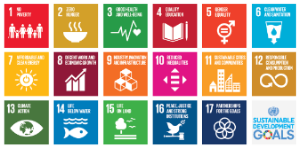The TRIPLE BENEFIT PRINCIPLE (TBP) and the Sustainable Development Goals (SDGs):
Just as the SDGs pertain to the Global South and the industrialized world, I too have shaped my life to match this focus. My work as a doctor in the Global South as well as in the industrialized country of Austria has given me the experience necessary to develop the TRIPLE BENEFIT PRINCIPLE.
Once you have successfully experienced the Triple Benefit Principle, it is easy to understand its importance for the accomplishment of the Sustainable Development Goals.

Here you see the relation to each goal, as follows:
SDG 1: No Poverty: By investing your achieved savings into projects for sustainable development in poor countries, poverty can be reduced.
SDG 2: No Hunger: By reducing the use of fossil fuels through cycling and other low carbon lifestyles, the negative effects on agriculture, especially in Global South, are reduced. Co-effect on SDG 1
SDG 3: Good Health and Well-Being: Individual, local, and global health effects are principle 2 of TBP.
SDG 4: Quality Education: TBP-workshops and seminars enhance knowledge and awareness, promote interdisciplinary sustainable thinking, and motivate to take activity for a necessary change and transformation.
SDG 5: Gender Equality: A bicycle is equally accessible for both sexes. This is also emphasized by the female cyclist in the TBP logo. It represents the opposite of an old-fashioned macho car driver behaviour.
SDG 6: Clean Water and Sanitation: Low carbon household and low carbon lifestyle go along with a reduction in water consumption in many processes and production, and with a reduction in the degradation of soils.
SDG 7: Affordable and Clean Energy: This is the fundament of the third benefit of TBP. Whereas some oil industries still extract more oil in order to invest gained revenue in so called sustainable technology, the Triple Benefit Principle reduces fossil energy consumption considerably in the first step and then invests thus saved money sustainably. This again enables further fossil fuel reduction. (See my article in Glocalist 281, Berlin 2010)
SDG 8: Decent Work and Economic Growth: TBP is a consistent way to reduce fossil-driven industry and to foster sustainable businesses. According to a WHO press release of 2014 ”Cycling can create at least 76,600 jobs and save 10,000 lives every year in major European cities.” Sustainable development within the planetary boundaries and a good life for all has priority over economic growth.
SDG 9: Industry, Innovation, and Infrastructure: Like in SDG 9, TBP focuses on sustainable industries. This means use of renewable energy, less oil, steel and concrete for buildings, cars and infrastructure like highways, parking lots, etc.
SDG 10: Reduced inequalities: TBP challenges the “flashy” car. (Ask me about my experinence as a family physician in a rural area in the 1990s on bicycle, when I developed TBP J)
SDG 11: Sustainable Cities and Communities: For this SDG, TBP is self-explanatory.
SDG 12: Responsible Consumption and Production: Step 1 of TPB lays the basis, step 2 and 3 enhance the effects.
SDG 13: Climate Action: TBP is Climate Action that – unlike political processes - can be started immediately by everybody and leads to very quick results when performed consistently.
SDG 14: Life below Water: Sustainable food as a part of sustainable consumption is part of benefit 1.
SDG 15: Life on land: Same reason as SDG 14
SDG 16: Peace, Justice and Strong Institutions: Cyclists do not need oil as fuel. They do not need wars for oil to fulfill their needs.
SDG 17: Partnerships for the Goals: Join the community of those who practice TBP! The bigger and stronger our network, the more we convince others. Our daily practical experience is convincing and will lead to a necessary transformation. As long as climate policy continues to fail, Triple Benefit Principle is a way to act.